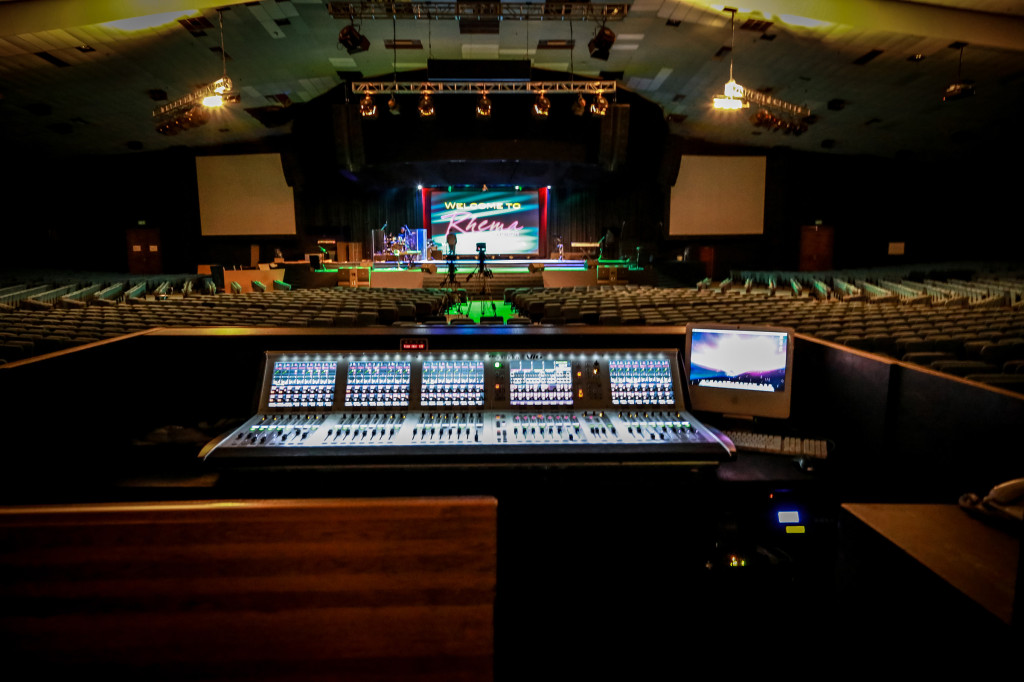A Dozen Tips to Better Church Sound & Team Work
by Hector La Torre

Rhema Bible Church in Randburg, Northwest Johannesburg, uses audio components from HARMAN’s JBL Professional, Crown, and Soundcraft.
Choose Wisely: Ready to upgrade or purchase a new sound system? Make sure always to check credentials when choosing sound contractor-installers or equipment dealers. Are they really experienced audio professionals or inexperienced A-V salespeople in sheep’s clothing? How much professional experience do they have? Does your equipment dealer offer service and assistance or just a lower price? Choose a qualified local sound contractor whenever possible. Ask for contact information of other church clients, and make sure you attend other churches where the contractor has installed systems. It’s all about due diligence and good financial stewardship.
Spare Me: Make sound & media a team effort. If you have only one soundperson, that person has to be there for all occasions. That means every wedding, baptism, Sunday Service and special event has to take precedence over personal family and vacation time. The outcome is that this overworked, underappreciated soundperson eventually leaves out of frustration, leaving the church high and dry. Show your team the church is willing to support them with good training and heartfelt encouragement.
Teach Them Well: Don’t skimp on training costs. Make training part of your yearly budget. Invest in your tech team. If you plan to purchase a new sound system or upgrade your existing system, depending on the overall budget, allocate from 5%-15% of the budget to training. What’s the point of having a great sound system if no one knows how to drive it?! BTW: Don’t send just your main soundperson to a training workshop and then expect him/her to come back and be able to teach everyone else on your media team. Personal experience should tell you that some of the best sound techs aren’t always great teachers, and that’s a heavy burden to place on inexperienced tech personnel. So find a good church sound workshop and send your entire team. (We suggest the How-TO Workshops, of course!)
Keep Them in the Loop: Many churches, for some unfathomable reason, do not include the sound/media team members in equipment purchase decisions. Yet this same team is then given the responsibility of making it all work — under pressure. Discuss your expansion plans months before you start pouring concrete for that new stage. Ask the team (or team leader) to research potential equipment updates well in advance of your budget deadlines. Then listen to their input. An informed and involved media team will present the church with better operational procedures and uplifted morale. Everyone likes to feel appreciated. Caveat: Make sure your team members have thoroughly researched the recommended equipment purchase, have heard it in use in other churches and know how to properly operate it. (See #4 above.) Church supply closets across the country are loaded with expensive gear that came highly recommended but that no one knew how to drive….
Give Them a Budget: It’s a given that the same gear that was broken last week will still be broken this week. Give your sound team a budget for gear repair and service; even a modest one is better than none at all. They need to replace damaged microphones, cables, connectors, DI boxes and all the other gear that gets stepped on, dropped and beat up.
Quarantine That Equipment: Make sure that damaged gear is separated from working gear … and then actually gets repaired. Damaged equipment will always and inevitably find its way back into the system just in time for a major event. Mark it; separate it; fix it!
Maintain Your Investment: Have a qualified sound contractor come in at least once or twice a year to clean and repair your sound system. This will save money because you prevent untimely equipment failure. As I’ve said: It is a given that equipment will fail during your most important service of the year. Don’t be penny-wise, pound-foolish. And notice I emphasized a qualified sound contractor; one whom you’ve checked out with other churches in your region. That does not mean your brother-in-law who wired up his own man-cave….
Musicians are Important Too: Seems like it’s always about the music — whether full instrumentation or a cappella. The music is always too loud or too soft or too fast or too slow. Everyone has an opinion. It is vital, therefore, to include at least the praise band leader and/or music director in every major media meeting. Develop trust between the praise and sound teams. Meaningful smooth presentations depend on teams working together. This tip leads to …
Practice, Practice…: Create a weekly schedule whereby your praise band and sound team rehearse together. Let them work out challenges before services, not during. Think about starting a Youth Night or Coffee Club Night where the sound and music teams can work together under less demanding conditions. It’s surprising to us at the HOW-TO Workshops how many churches throughout the country tell us that the sound team and worship-praise team rehearse on different nights. Is it any wonder they can’t come together for the service?
Lower Stage Volume: Is anyone out there? That is the question you’ll be asking yourself if stage volume from the praise band is always too loud. It’s a simple equation: music that’s too loud + poor sound system operation = fewer congregation members. There are techniques and equipment to reduce stage levels to a point where both church members and praise band members will be equally happy. No need to lose membership support.
Be Acoustically Sound: One of the great challenges facing many of today’s houses of worship is that — acoustically speaking — the buildings continue to be constructed the same way they were hundreds of years ago, long before we had amplified music instruments and sound systems. Beauty often seems to trump usefulness. If you are building an addition or re-modeling an existing structure that will include amplified music, please make sure your architect has an acoustician on the team. And make sure that acoustician knows that electric instruments will be part of worship services. No amount of amplification or quality of sound equipment can overcome poor, inappropriate acoustic design. Many problems with inadequate sound coverage, feedback and loudness control are the result of poor/uninformed construction and design choices, not the fault of the sound equipment or its operators.
Shocking Advice: Nearly all musicians and sound techs have at some point received an electrical shock from their equipment. Most players and techs take shocks as simply part of the job. But guess what? That should not be your standard operating procedure. A shock, even a mild shock, means that something is wrong with the overall electrical system — mis-wiring, ineffective grounding — whether in your church or a music club. And the next shock could be a fatal one. It doesn’t take much of a shock to send your heart into fibrillation, and unless there’s medical attention close by you may have preached your final sermon or played your final note.
Make sure that you get off the stage or from behind the pulpit and don’t go back until a licensed electrician has checked the entire electrical system for faults. And if a baptismal pool is part of your services, do not go near the pool with a hardwired microphone or electric instrument. We’ve already had too many folks killed by inadvertently stepping into water because a pool has leaked or pump has failed. Check our sister web site, www.noshockzone.org, for information on electrical challenges and solutions for everything from the stage to your touring RV.
 Hector La Torre is Managing Partner of Fits & Starts Productions, which produces the nationally-recognized HOW-TO Church Sound Workshop tours. Now in their 14th year the hands-on HOW-TO Workshops are focused on hands-on training church sound, praise and media teams in the art and operation of sound and media equipment. The tour travels to 36 cities each year. See www.howtosound.com to visit the HOW-TO Sound Workshops and see the latest tour schedule.
Hector La Torre is Managing Partner of Fits & Starts Productions, which produces the nationally-recognized HOW-TO Church Sound Workshop tours. Now in their 14th year the hands-on HOW-TO Workshops are focused on hands-on training church sound, praise and media teams in the art and operation of sound and media equipment. The tour travels to 36 cities each year. See www.howtosound.com to visit the HOW-TO Sound Workshops and see the latest tour schedule.




